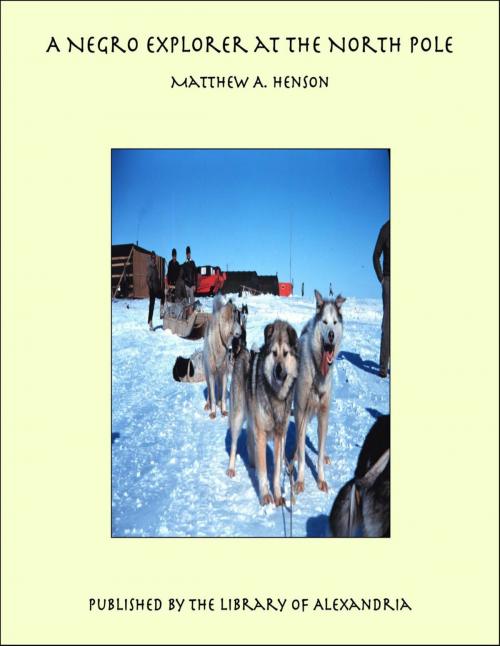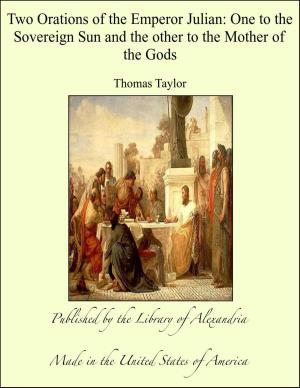A Negro Explorer at the North Pole
Nonfiction, Religion & Spirituality, New Age, History, Fiction & Literature| Author: | Matthew A. Henson | ISBN: | 9781465553294 |
| Publisher: | Library of Alexandria | Publication: | March 8, 2015 |
| Imprint: | Language: | English |
| Author: | Matthew A. Henson |
| ISBN: | 9781465553294 |
| Publisher: | Library of Alexandria |
| Publication: | March 8, 2015 |
| Imprint: | |
| Language: | English |
Friends of Arctic exploration and discovery, with whom I have come in contact, and many whom I know only by letter, have been greatly interested in the fact of a colored man being an effective member of a serious Arctic expedition, and going north, not once, but numerous times during a period of over twenty years, in a way that showed that he not only could and did endure all the stress of Arctic conditions and work, but that he evidently found pleasure in the work. The example and experience of Matthew Henson, who has been a member of each and of all my Arctic expeditions, since '91 (my trip in 1886 was taken before I knew Henson) is only another one of the multiplying illustrations of the fact that race, or color, or bringing-up, or environment, count nothing against a determined heart, if it is backed and aided by intelligence. Henson proved his fitness by long and thorough apprenticeship, and his participation in the final victory which planted the Stars and Stripes at the North Pole, and won for this country the international prize of nearly four centuries, is a distinct credit and feather in the cap of his race. As I wired Charles W. Anderson, collector of internal revenue, and chairman of the dinner which was given to Henson in New York, in October, 1909, on the occasion of the presentation to him of a gold watch and chain by his admirers: "I congratulate you and your race upon Matthew Henson. He has driven home to the world your great adaptability and the fiber of which you are made. He has added to the moral stature of every intelligent man among you. His is the hard-earned reward of tried loyalty, persistence, and endurance. He should be an everlasting example to your young men that these qualities will win whatever object they are directed at. He deserves every attention you can show him. I regret that it is impossible for me to be present at your dinner. My compliments to your assembled guests." It would be superfluous to enlarge on Henson in this introduction. His work in the north has already spoken for itself and for him. His book will speak for itself and him.
Friends of Arctic exploration and discovery, with whom I have come in contact, and many whom I know only by letter, have been greatly interested in the fact of a colored man being an effective member of a serious Arctic expedition, and going north, not once, but numerous times during a period of over twenty years, in a way that showed that he not only could and did endure all the stress of Arctic conditions and work, but that he evidently found pleasure in the work. The example and experience of Matthew Henson, who has been a member of each and of all my Arctic expeditions, since '91 (my trip in 1886 was taken before I knew Henson) is only another one of the multiplying illustrations of the fact that race, or color, or bringing-up, or environment, count nothing against a determined heart, if it is backed and aided by intelligence. Henson proved his fitness by long and thorough apprenticeship, and his participation in the final victory which planted the Stars and Stripes at the North Pole, and won for this country the international prize of nearly four centuries, is a distinct credit and feather in the cap of his race. As I wired Charles W. Anderson, collector of internal revenue, and chairman of the dinner which was given to Henson in New York, in October, 1909, on the occasion of the presentation to him of a gold watch and chain by his admirers: "I congratulate you and your race upon Matthew Henson. He has driven home to the world your great adaptability and the fiber of which you are made. He has added to the moral stature of every intelligent man among you. His is the hard-earned reward of tried loyalty, persistence, and endurance. He should be an everlasting example to your young men that these qualities will win whatever object they are directed at. He deserves every attention you can show him. I regret that it is impossible for me to be present at your dinner. My compliments to your assembled guests." It would be superfluous to enlarge on Henson in this introduction. His work in the north has already spoken for itself and for him. His book will speak for itself and him.















